Abacus Data Poll: Conservatives lead Liberals by 18
March 24, 2024
From March 16 to 21, 2024, Abacus Data conducted a national survey of 3,550 adults exploring several topics related to Canadian politics and current events as part of our regular national omnibus surveys. In this survey, we oversampled both Ontario and Alberta to get a better sense of what is happening in those provinces. Tomorrow, we will release new polling on the Ontario political landscape.
In this edition of our Canadian politics tracking, we report on our usual metrics along with some new data on how Canadians feel about the Trudeau government and the relationship with vote intention.
Conservatives lead by 17 over the Liberals.
If an election were held today, 41% of committed voters would vote Conservatives with the Liberals at 23%, the NDP at 19% and the Greens at 4%. The BQ is at 33% in Quebec.
Since our last survey, the Conservatives and Liberals are down 1 and the NDP is up 1. Since the beginning of the year, we have seen stability in vote intentions with the Conservatives consistently in the low 40s and the Liberals stuck in the low to mid 20s.
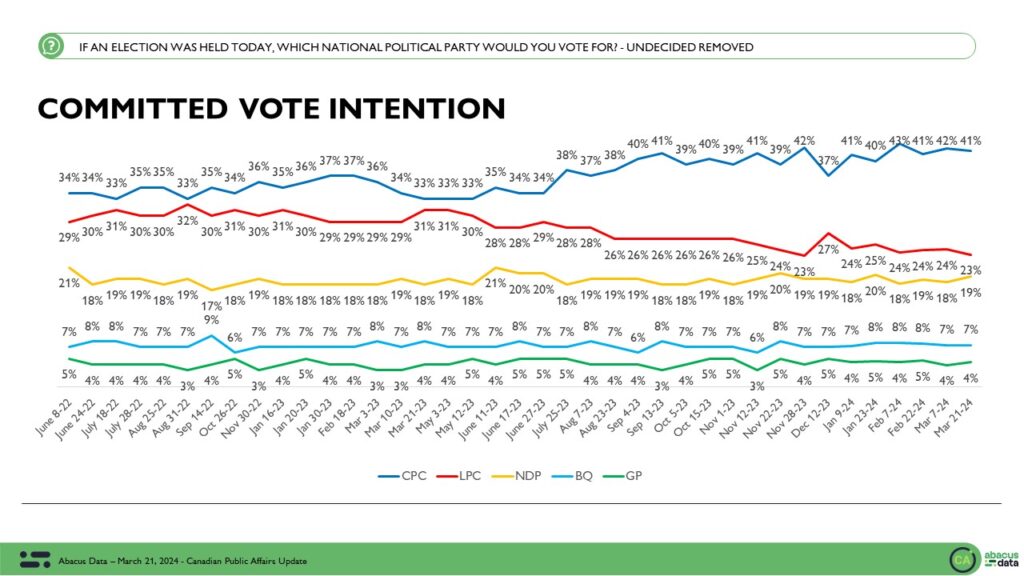
Regionally, the Conservatives are well ahead in the Prairies, lead by 11 in BC and 16 in Ontario. In Atlantic Canada, the Conservatives are 17-points ahead of the Liberals while in Quebec, the BQ leads by 7 over the Liberals with the Conservatives six points behind the Liberals at 20%.
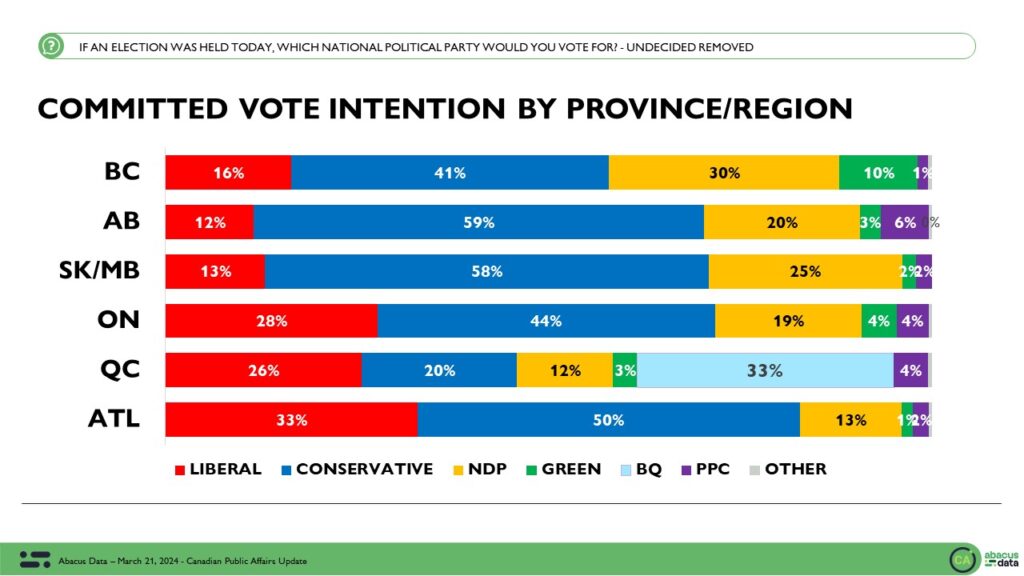
If we isolate British Columbia, Ontario, and Atlantic Canada only, we find the Conservatives holding steady at 44% and the Liberals at 26%.
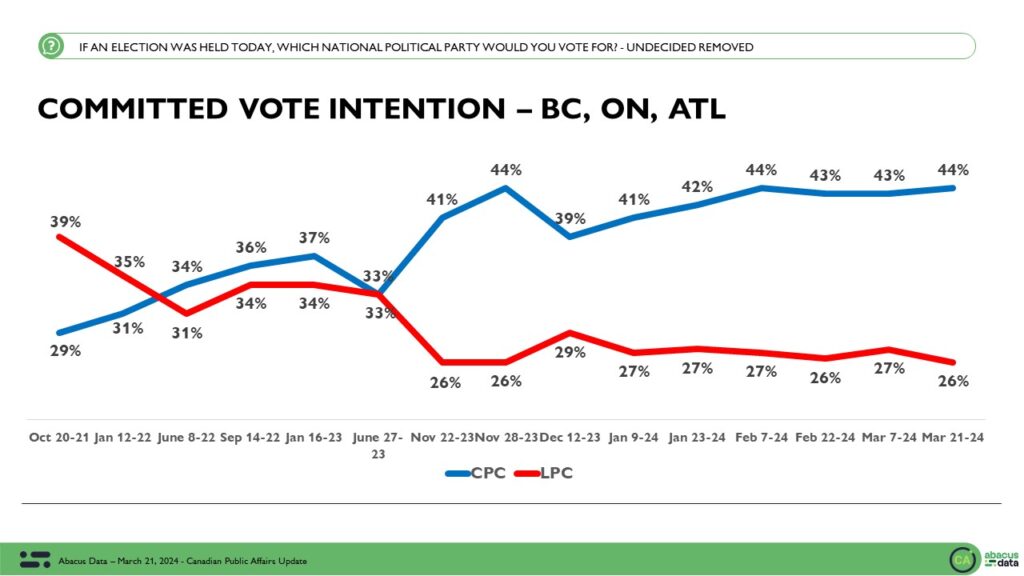
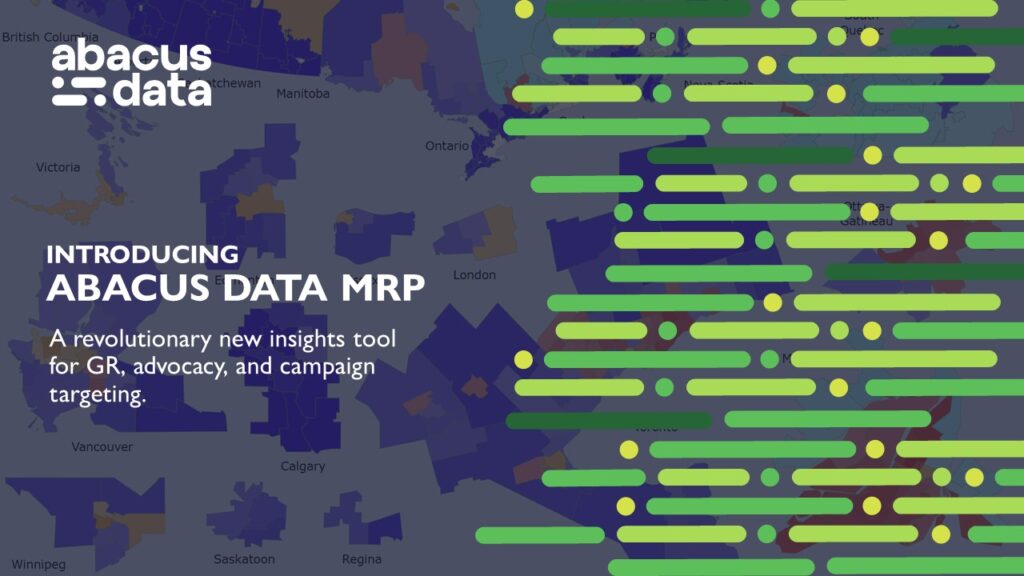
Demographically, the Conservatives lead among all age groups with the Liberal vote share correlated with age. The Liberal vote share rises as the age of the respondent increases. The opposite is true for the NDP. For a deeper analysis of how millennials have shifted their preferences over the past 8 years, see my substack here.
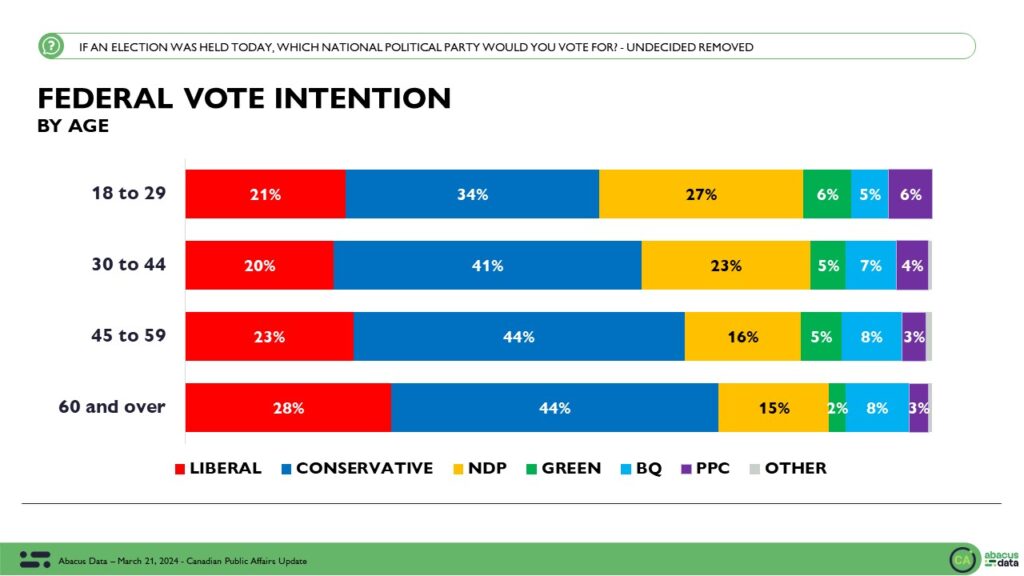
The Conservatives continue to capture a larger share of the vote among both men and women. Liberal vote share is the same among men and women while the NDP does 9-points better among women than it does among men. For a deep dive on the differences between men and women, check out this analysis by my colleague Oksana Kishchuk released on Friday.
When we ask people if they would consider voting for each of the main political parties, 52% say they are open to voting Conservative (unchanged from last month) while, 41% are open to voting Liberal (up 2). 42% say they are open to voting NDP.
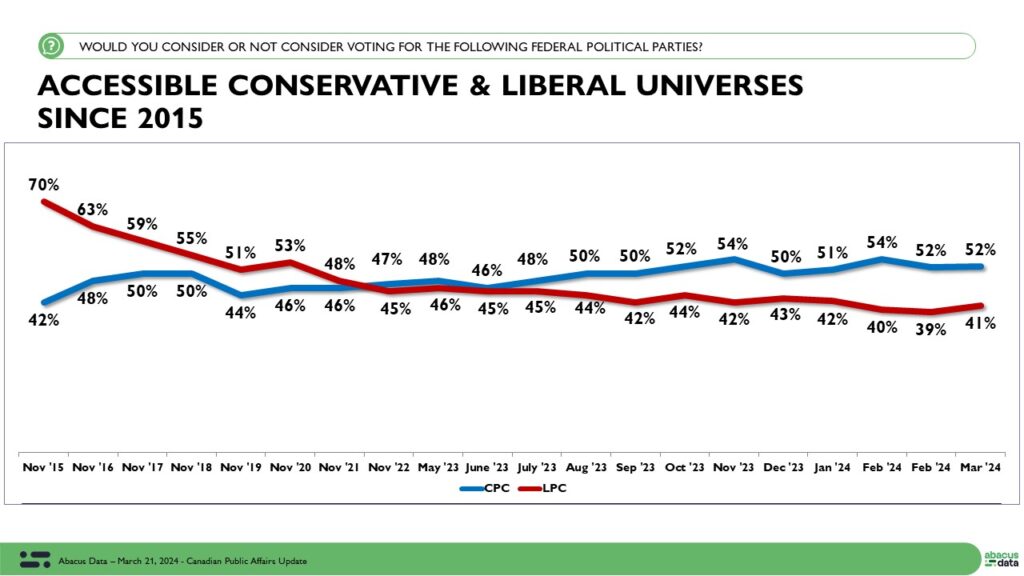

We continue to measure voter motivation by political party.
We find that Conservative supporters are more likely to say they would vote than Liberal or NDP supporters while Liberal supporters are more certain to vote than NDP supporters.
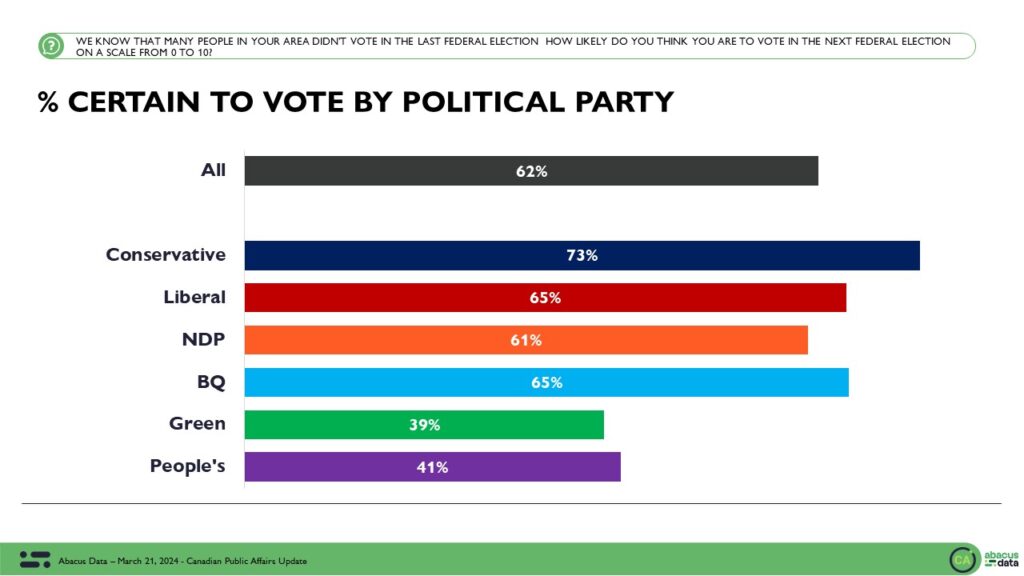
What else are Canadians thinking?
The mood of the country hasn’t changed since earlier this month and has been fairly consistent since the start of the year. Today, only 1 in 4 think Canada is headed in the right direction and only 16% feel optimistic about the direction of the world as a whole. This mood continues to be very sour.
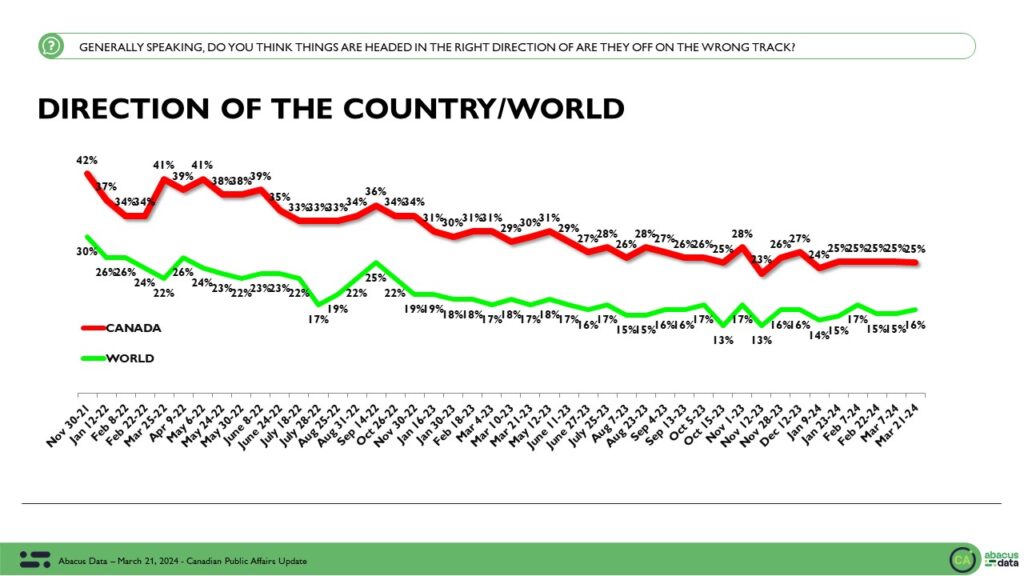
The federal government’s approval rating is unchanged from last wave. 26% approve while 59% disapprove of the job performance of the federal government led by Justin Trudeau, up a single point and within the margin of error. Those disapproving of the federal government’s performance has been between 56% and 59% since September 2023.
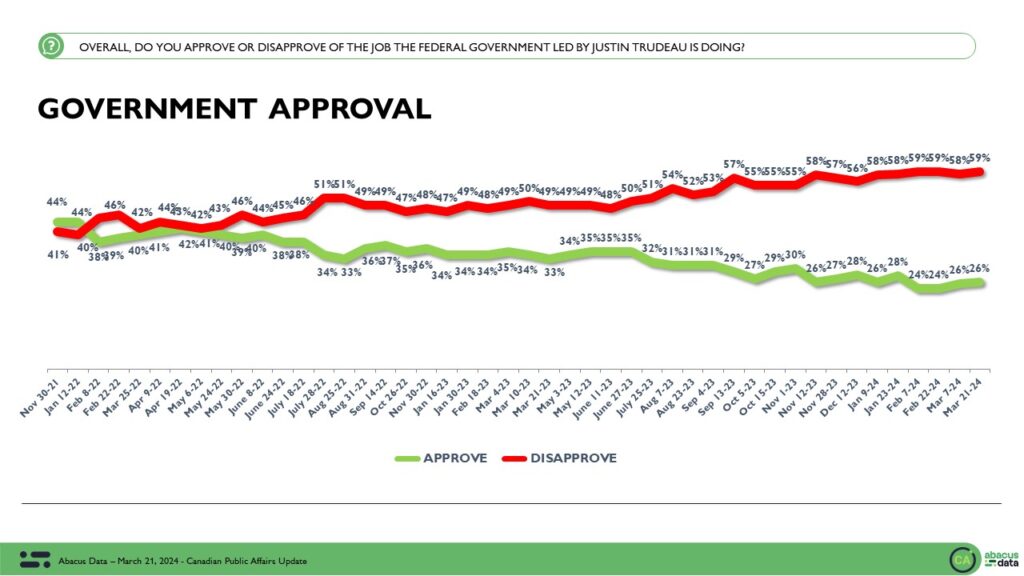
Impressions of Justin Trudeau are static. 58% have a negative impression of the Prime Minister and 24% have a positive view for a net score of -34.
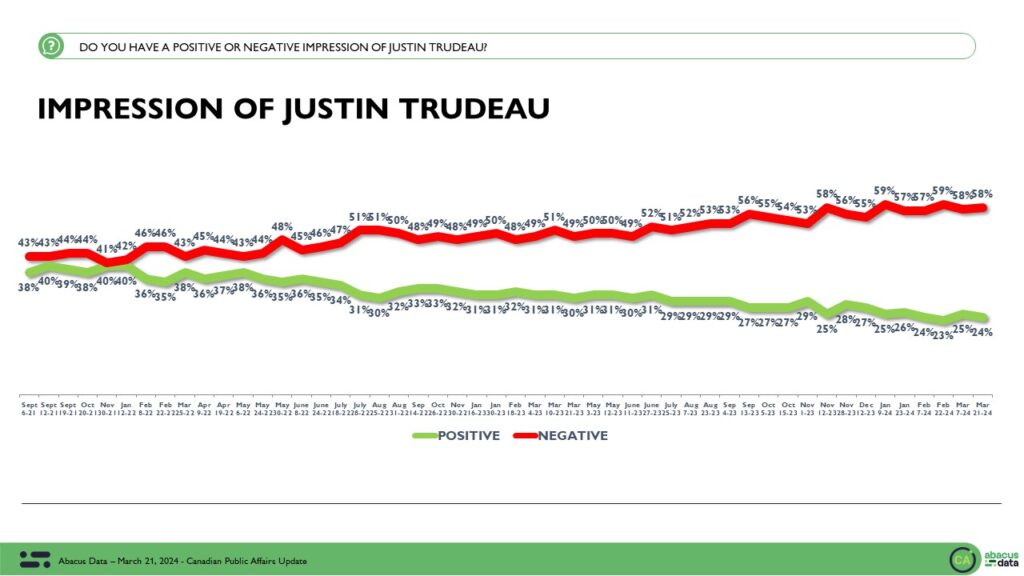
In contrast, impressions of Pierre Poilievre are also unchanged with 38% viewing him positively and 34% negatively for a net score of +4.
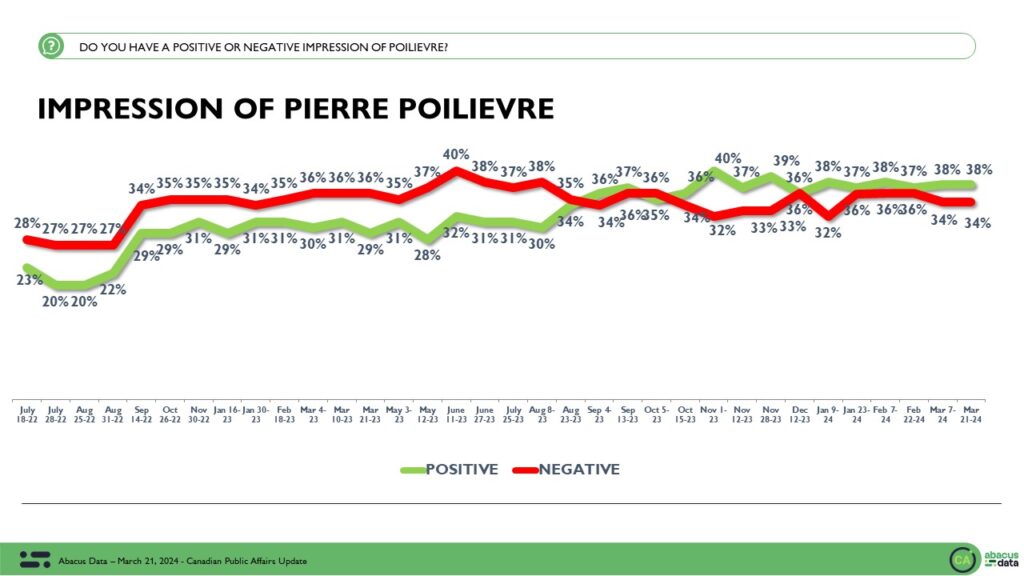
Feelings about NDP Leader Jagmeet Singh are also largely unchanged. Today 33% have a negative impression compared with 33% who have a positive one for a net score of 0.
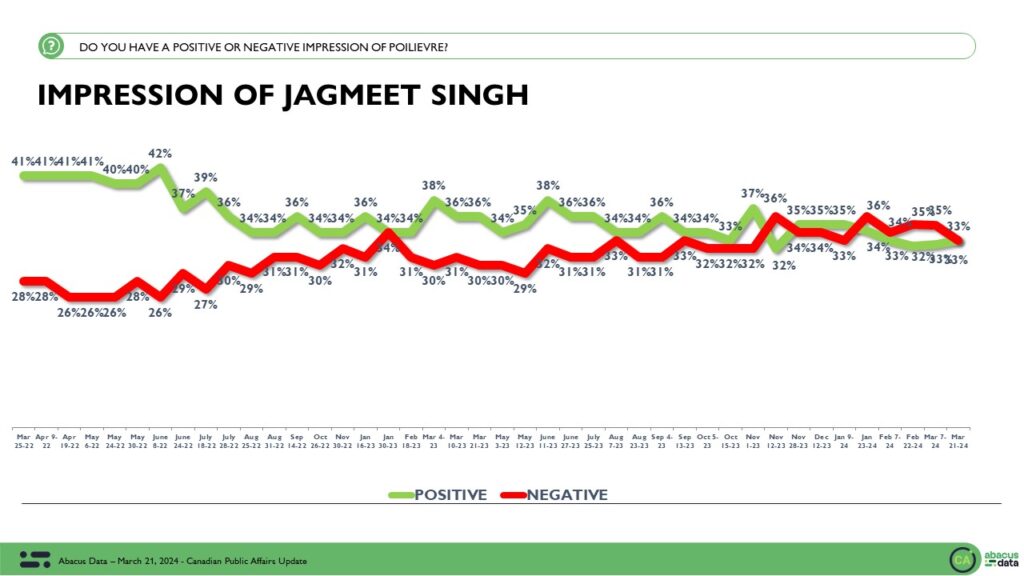
15% of Canadian adults believe Justin Trudeau and the Liberals deserve to be re-elected, unchanged from last month while those who think it’s time for a change and feel there’s an acceptable alternative is at 52%, around the average since September 2023. We will continue to monitor this perception as it may be a leading indicator for vote intention.
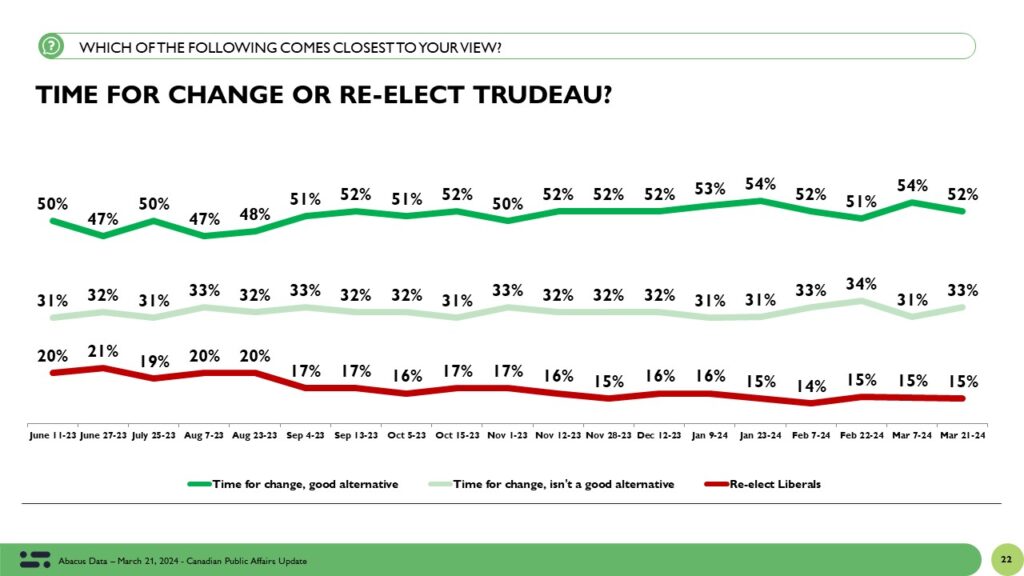
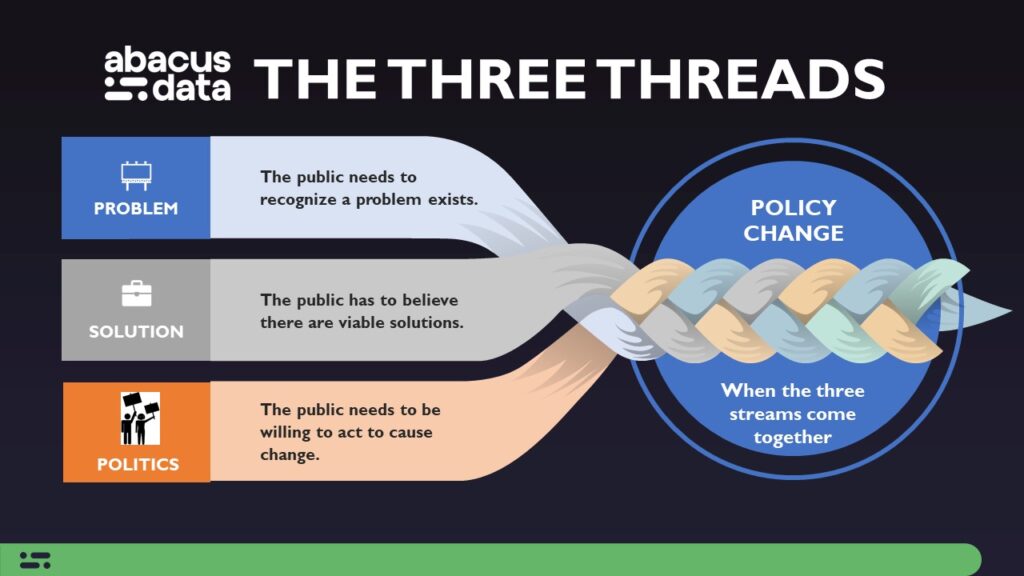
at polling for public affairs and advocacy.
The view that the Conservatives will win the next election continues to grow. Today, 46% think the Conservatives will win the next election (down 1 since last wave) and up 7 points since October 2023. 21% think the Liberals will win, while 8% think the NDP will win. 1 in 4 Canadians are unsure or say another party will win.
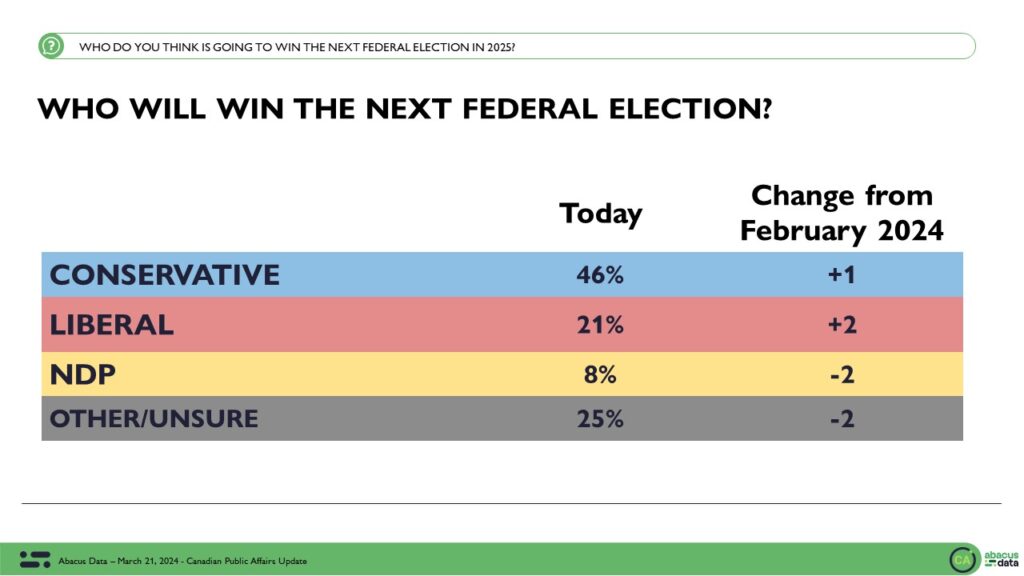
Finally, in this survey we Canadians to share their view on the Trudeau government. They were shown pairs of statements/words and asked which best describes the federal government at moment.
Half or more Canadians believe the federal government led by Justin Trudeau is
- Distracted (56%) rather than focused (24%)
- Focused on the wrong priorities (61%) rather than on the right priorities (23%)
- Closed (53%) rather than transparent (22%)
- Ineffective (48%) rather than effective (24%)
And close to half feel it is:
- Reactive (48%) rather than proactive (22%)
- Divisive (47%) rather than unifying (25%)
- Indifferent (44%) rather than empathetic (44%).
More than a third of Canadians feel the federal government is ambitious while 34% describe it as collaborative rather than adversarial.
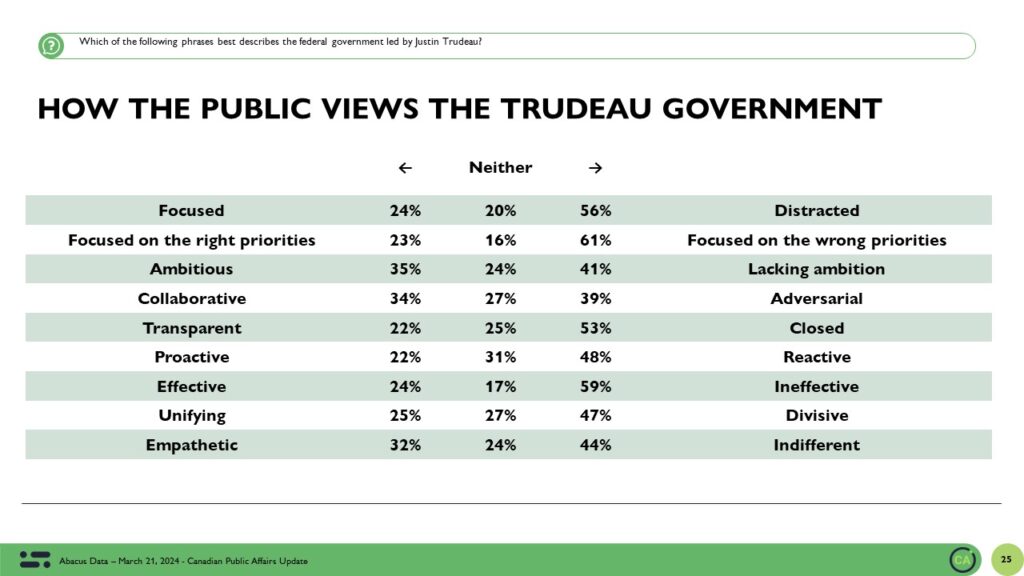
And the importance of these perceptions are shown when we look at the correlation between perceptions and vote intention. The table below reports the Liberal vote share by response. It shows that the strongest predictors of support for the Liberals are perceptions it is effective, focused on the right priorities, focused, and transparent. If the government wants to improve it’s image, focusing on those perceptions would be the most effective way to do that.
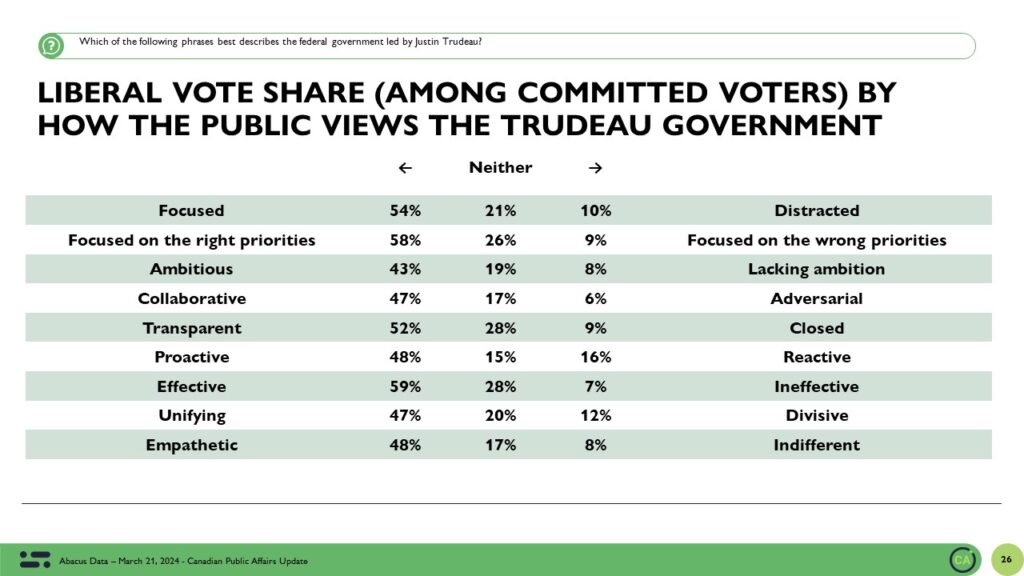
The Upshot
According to Abacus Data CEO David Coletto: “Little if anything has changed over the past two weeks in terms of political opinions in Canada.
The mood of the country remains quite negative, with only one in four Canadians believing that the country is headed in the right direction. This consistent sentiment is mirrored in the federal government’s approval ratings, with 59% disapproving of the job performance of the government led by Justin Trudeau. These perceptions are crucial as they continue to shape the political narrative and the filter by which people assess decisions and events in and around Ottawa.
In evaluating the Trudeau government, Canadians expressed concerns about its focus and effectiveness, with a majority viewing the government as distracted, focused on the wrong priorities, and closed. These perceptions are closely tied to vote intention, suggesting any path back to competitiveness for the Liberals will require it to address these public perceptions.
While the Conservatives enjoy a commanding lead, our data suggests they might be approaching their maximum potential support, particularly with the notable challenge of gaining traction in Quebec. The real test now is to solidify the new coalition they have built across various demographics and regions. This involves not just holding onto their current support base but reinforcing the commitment of those who have recently aligned with them. The Conservatives are uniquely equipped with the resources needed to engage in this critical consolidation effort, almost unparalleled in the current political landscape. Ensuring that their newfound coalition feels heard and represented could be pivotal in transforming their polling strength into lasting electoral success.”
Looking to conduct polling or market research in 2024? Have budget left to spend before the end of March? Send Yvonne an email to connect with the Abacus Data team today!
Methodology
The survey was conducted with 3,550 Canadian adults from March 16 to 21, 2024. A random sample of panelists were invited to complete the survey from a set of partner panels based on the Lucid exchange platform. These partners are typically double opt-in survey panels, blended to manage out potential skews in the data from a single source.
The margin of error for a comparable probability-based random sample of the same size is +/- 1.7%, 19 times out of 20.
The data were weighted according to census data to ensure that the sample matched Canada’s population according to age, gender, educational attainment, and region. Totals may not add up to 100 due to rounding.
This survey was paid for by Abacus Data Inc.
Abacus Data follows the CRIC Public Opinion Research Standards and Disclosure Requirements that can be found here: https://canadianresearchinsightscouncil.ca/standards/
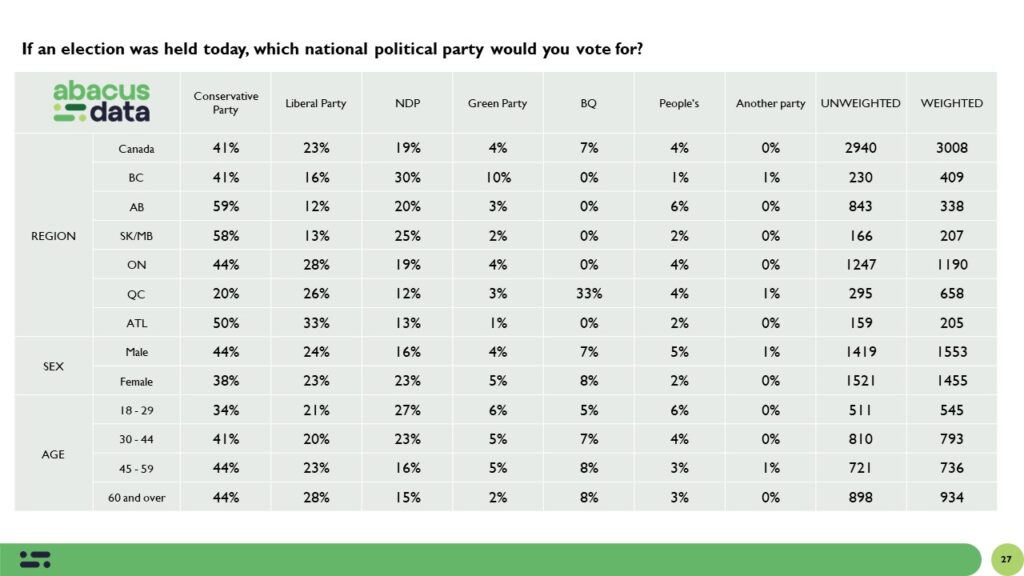
ABOUT ABACUS DATA
We are Canada’s most sought-after, influential, and impactful polling and market research firm. We are hired by many of North America’s most respected and influential brands and organizations.
We use the latest technology, sound science, and deep experience to generate top-flight research-based advice to our clients. We offer global research capacity with a strong focus on customer service, attention to detail, and exceptional value.
And we are growing throughout all parts of Canada and the United States and have capacity for new clients who want high quality research insights with enlightened hospitality.
Our record speaks for itself: we were one of the most accurate pollsters conducting research during the 2021 Canadian election following up on our outstanding record in the 2019, 2015, and 2011 federal elections.
Contact us with any questions.
Find out more about how we can help your organization by downloading our corporate profile and service offering.




